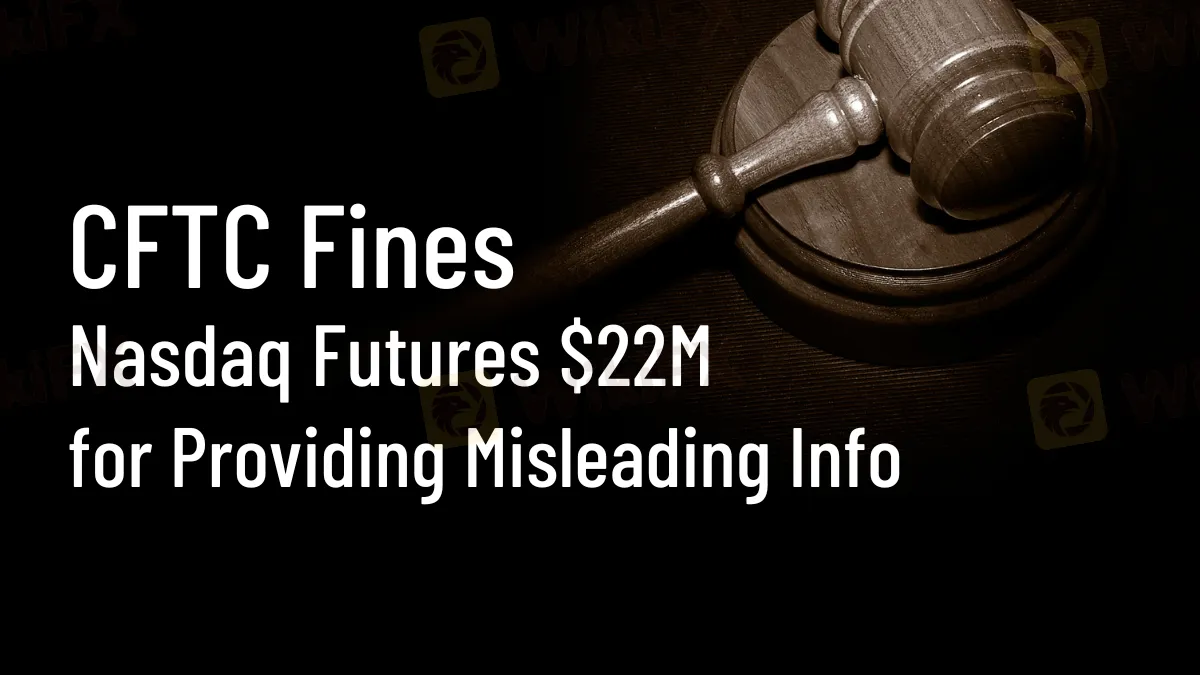简体中文
繁體中文
English
Pусский
日本語
ภาษาไทย
Tiếng Việt
Bahasa Indonesia
Español
हिन्दी
Filippiiniläinen
Français
Deutsch
Português
Türkçe
한국어
العربية
CFTC Fines Nasdaq Futures $22M for Providing Misleading Info
Abstract:CFTC fines Nasdaq Futures $22M for providing misleading info and violating Core Principles. This penalty underscores the importance of transparency in financial markets.

Washington, DC - The Commodity Futures Trading Commission (CFTC) fined Nasdaq Futures, Inc. $22 million, a former designated contract market (DCM). The penalty is the result of the company's failure to disclose important data about its incentive programs to both the CFTC and the public, as well as submitting incorrect and misleading information to the regulatory body. This fine emphasizes the CFTC's strict regulation of market activities as well as the value of openness in the financial sector.
Violation of Core Principles
The CFTC's inquiry showed that Nasdaq Futures, Inc. failed to create, monitor, or enforce regulations governing an incentive program given to select traders on its platform. The Commodity Exchange Act (CEA) requires DCMs, such as Nasdaq Futures, to follow specified Core Principles aimed at maintaining market integrity and safeguarding participants. Among these principles is the duty to provide the CFTC, market participants, and the general public with accurate and full information.
Nasdaq Futures, Inc. failed in this respect by failing to disclose all aspects of its incentive scheme. In particular, the business did not notify the CFTC about a volume-based component of its “Designated Market Maker” (DMM) program. This component provides extra payouts to specific participants depending on the overall amount of contracts exchanged, a critical fact that was concealed in CFTC communications.
False and Misleading Statements
Nasdaq Futures, Inc., was a DCM that specialized in energy commodity futures contracts between July 2015 and July 2018. During this time, the business launched a number of incentive schemes, including the DMM program, which paid a set monthly stipend to market makers to boost market liquidity. However, the CFTC was purposely kept unaware of the existence of a volume-based incentive inside this scheme.

According to the CFTC's ruling, Nasdaq Futures, Inc. provided incorrect and misleading information concerning the DMM program. When questioned by CFTC officials, workers consistently denied the existence of volume-based incentives despite the fact that such payments were given to some program participants. These practices violated the CEA and undercut the CFTC's expectation of trust and openness from regulated firms.
Regulatory Oversight and Compliance Failures
The CFTC's ruling also cited Nasdaq Futures, Inc.'s failure to follow regulatory service provider guidelines. The corporation was instructed to contact three DMM program members about a particular trading activity, but it did not do so and did not record the reasons for its decision. This lapse added to the breaches of other DCM Core Principles.
CFTC Director of Enforcement Ian McGinley underscored the gravity of the infractions, adding, “The CFTC's oversight regime is dependent on CFTC-designated exchanges providing accurate information to the CFTC and market participants.” Nasdaq Futures, Inc.'s actions here constitute severe breaches of both its responsibility to furnish such information and multiple statutory Core Principles applicable to CFTC-designated exchanges.
Consequences and Industry Impact
The $22 million civil monetary penalty issued on Nasdaq Futures, Inc. exemplifies the repercussions of failing to comply with regulatory standards. The CFTC's action emphasizes the significance of openness and correct reporting in ensuring market stability.
This case is keenly watched by the financial sector, as it demonstrates the CFTC's commitment to holding corporations accountable for their activities. The penalties also send a strong message to all market players about the necessity of complying with regulatory requirements and the consequences of non-compliance.
The CFTC expressed gratitude to the National Futures Association for their help in this instance. Brett Shanks, Elsie Robinson, Jeff Le Riche, Brandon Wozniak, Margaret Aisenbrey, Jordon Grimm, Christopher Reed, Charles Marvine, and former Division of Enforcement employee Jo Mettenburg were all engaged in this case.
Conclusion
Nasdaq Futures, Inc. received a $22 million penalty for failing to disclose critical information and making deceptive representations to the CFTC. This case emphasizes the crucial necessity of regulatory compliance and openness in financial markets and confirms the CFTC's responsibility to ensure market stability.
Stay updated on this and other financial news by visiting our WikiFX news page for the latest updates and in-depth coverage.

Disclaimer:
The views in this article only represent the author's personal views, and do not constitute investment advice on this platform. This platform does not guarantee the accuracy, completeness and timeliness of the information in the article, and will not be liable for any loss caused by the use of or reliance on the information in the article.
Read more

Top 10 Trading Indicators Every Forex Trader Should Know
Master the top 10 Forex trading indicators to analyze real-time Forex quotes, trends, and market signals. Learn strategies to boost accuracy and avoid mistakes.

WikiEXPO Global Expert Interview: Simone Martin—— Exploring Financial Regulation Change
In the midst of financial innovation and regulation, WikiGlobal, the organizer of WikiEXPO, stays abreast of industry trends and conducts a series of insightful and distinctive interviews on pivotal topics. We are delighted to have the privilege of inviting Simone Martin for an in-depth conversation this time.

MultiBank Group Wins Big at Traders Fair Hong Kong 2024
Discover how MultiBank Group, a global leader in financial derivatives, secured three prestigious awards at Traders Fair Hong Kong 2024, highlighting its innovative trading solutions and industry excellence.

CySEC Settles Compliance Case with Fxview Operator Charlgate Ltd
Discover how CySEC resolved compliance issues with Charlgate Ltd, the operator of Fxview, through a €50,000 settlement. Explore the investigation, regulatory measures, and CySEC's new website designed for improved accessibility and transparency.
WikiFX Broker
Latest News
Geopolitical Events: What They Are & Their Impact?
Top 10 Trading Indicators Every Forex Trader Should Know
Why Do You Feel Scared During Trade Execution?
Currency Calculator


